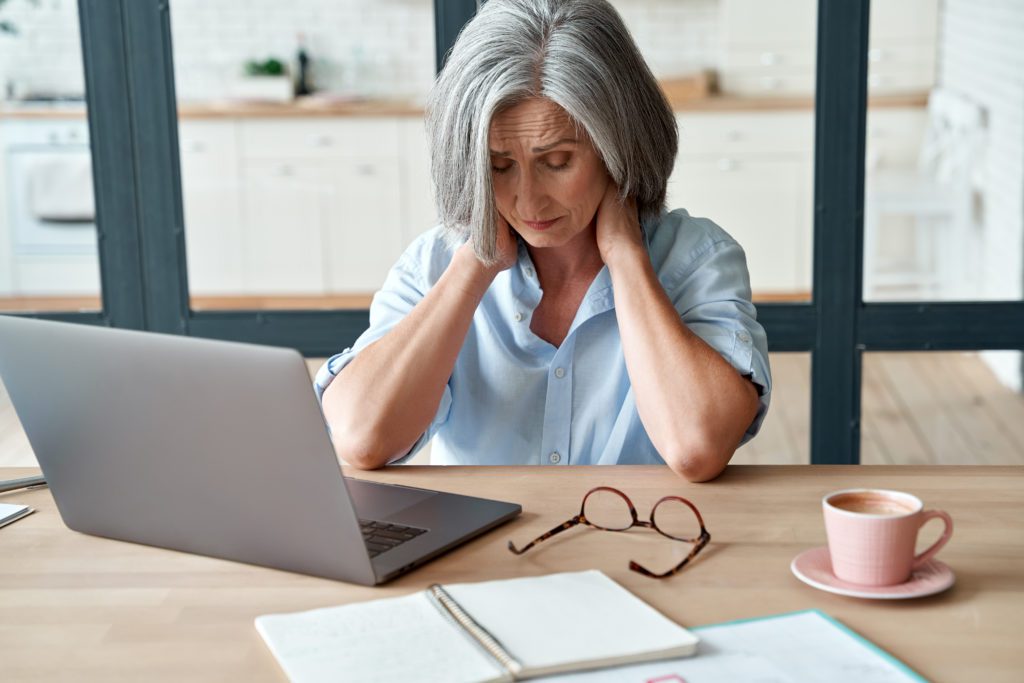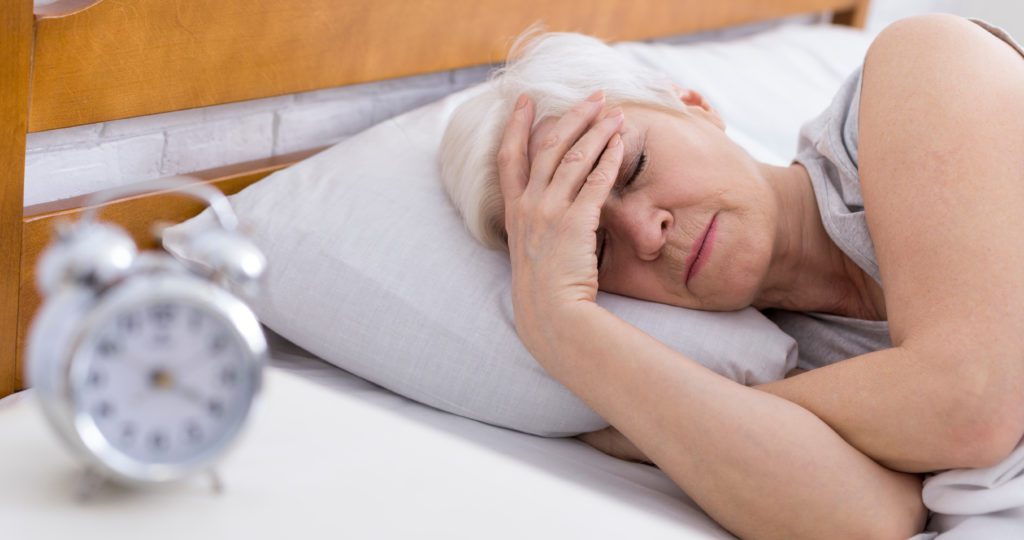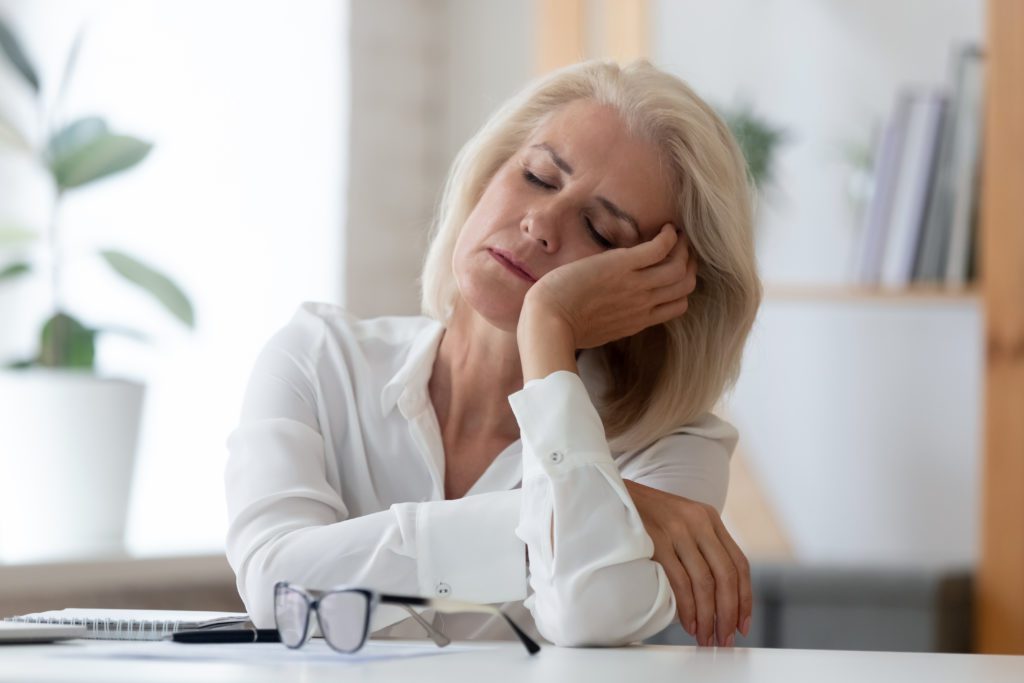When it comes to menopause, there are many different side effects a woman will experience. From hot flashes to mood swings, each side effect can cause an array of mental, physical, and emotional problems for the woman experiencing them. However, arguably one of the most draining side effects of menopause is fatigue. Fatigue is a common symptom of menopause that many women will experience as a result of estrogen changes in the body. However, there are many different ways you can help to reduce fatigue during this time with simple lifestyle changes or with the help of a doctor. And in this article, we’re going to talk all about them.
From your supplements to lifestyle changes, here’s our complete guide to fatigue during menopause and how you can ease them to help your mood stay as balanced as possible.

What is Menopause Fatigue?
To start, fatigue can best be described as a constant feeling of being drained, no matter how much you sleep. Fatigue is typically one of the earlier signs of menopause that starts around the time of perimenopause as a result of the changes in estrogen levels taking place in the body. These hormonal changes can cause problems with concentration, your mental health, and your energy levels. Not to mention, these changes can also make it harder for you to sleep at night, as they have a direct effect on the sleep-wake cycle, which can leave you feeling tired during the day.
However, many other symptoms, aside from mental and physical exhaustion, also accompany the feeling of fatigue and can signify your transition into menopause. A few other common signs you might notice alongside your regular fatigue symptoms might include:
- Anxiety
- Irritability
- Confusion
- Frequent hunger
- Weight gain
- Emotional stress
With that said, fatigue is so much more than just feeling tired and weighed down and can ultimately contribute to a negative mental and physical state. Not to mention, constant fatigue is not sustainable for daily activities such as going to work. Therefore, it is important to do all that you can to ease these symptoms as soon as they arise.

Causes of Menopause Fatigue
Now, when it comes to the causes of fatigue, as mentioned above, the changes and fluctuations in hormone levels have a direct effect on fatigue in women during perimenopause and menopause. This is because the rise and fall of hormones progesterone and estrogen in the body can cause the body to become overworked and can make a woman feel tired from seemingly nothing.
How Long Does Fatigue Last?
When it comes to the question of how long menopausal fatigue lasts, as with other menopause symptoms, the length does vary per woman. However, according to medical experts, the average woman can expect to experience menopausal fatigue and other symptoms for around eight years.

Ways to Treat Menopause Fatigue
Next, when it comes to the question of how to treat fatigue menopause, there are thankfully a variety of ways to help ease the effects. Here’s a brief overview of some of the best ways to combat fatigue during menopause.
Treatments
1. Hormone replacement therapy
The first and most effective treatment for menopause fatigue and other symptoms such as hot flashes is hormone replacement therapy. Hormone replacement therapy (HRT) is where women take certain medications that contain estrogen to help better regulate hormone levels and to help relieve their menopausal symptoms. In terms of fatigue, hormone therapy is believed to be able to help correct and balance out your metabolic system, which plays a large role in the cause of fatigue.
However, hormone replacement therapy does come with many risks and potential health concerns and isn’t usually the first option doctors will recommend because of this, despite how effective it is. Therefore, if you’re considering starting hormone replacement, make sure you make an appointment to discuss it fully with your doctor prior in order to properly understand the risks and benefits for you individually.
2. Acupuncture
Next, surprisingly a large number of women have found that physical therapies such as acupuncture have been able to help improve their fatigue. Studies have shown that acupuncture may be able to help with everything from boosting your energy levels, easing exhaustion, and helping sleep-related issues, such as insomnia during perimenopause and menopause stages. Therefore, you may want to consider talking to a physical therapist about the possibility of trying an acupuncture treatment to help soothe your menopause symptoms.
Supplements
Next, if you’re looking for a more natural way to treat fatigue during menopause, herbal supplements may be worth trying out. Here’s a list of a few of the most common supplements taken for menopause fatigue.

1. Rhodiola Rosea extracts
The first supplement often recommended for fatigue during menopause is Rhodiola Rosea extracts. Rhodiola Rosea is an herbal supplement used to help reduce stress, anxiety, depression, and fatigue. These powerful soothing properties are thanks to it’s adaptogenic properties that help to boost energy and assist with mental relaxation and focus. And because of its other natural properties, like its ability to help balance the hormones, this is a supplement that is excellent for other side effects of menopause, such as mood swings. However, it does come with risks, just like any other supplement, and should be discussed with your doctor prior to taking it.
You can read more about the many other benefits of Rhodiola Rosea extract here on healthline.com.
2. Soy protein isoflavones
Another common supplement recommended for taking during menopause is soy protein isoflavones. Often referred to as phytoestrogens, soy protein isoflavones have been shown through research to help reduce many of the negative effects of menopause, such as hot flashes and mood swings. This is because soy protein isoflavones help to mimic the effects of estrogen in the body, which can help to balance out the hormones and ease many of the side effects of menopause.
However, as with the other supplements mentioned, make sure you discuss the additional intake of soy with your doctor prior to taking it to be safe.
3. Melatonin supplements
Next, melatonin supplements are yet another common supplement women take during menopause to assist with fatigue. This is because during menopause, the estrogen in the body decreases, which in turn also causes your melatonin levels to decrease (which are known for playing a large part in the sleep-wake cycle). Therefore, taking melatonin in low doses has been shown to help with sleep-related issues during menopause, which can help you to improve the quality of your sleep, thus reducing sleep-induced fatigue.
Of course, everything comes with side effects and should be discussed with a doctor prior to taking it. You can read more about the effects of melatonin supplements for menopause on ncbi.gov.
4. Magnesium supplements
Next, as we suggested in our Guide to Menopause Insomnia article, magnesium is another supplement you may want to consider taking during menopause if you’re suffering from fatigue. Research shows that a low magnesium level in the body may negatively affect the body’s thyroid function, which can lead to the uncomfortable and sluggish feeling that goes along with fatigue. However, taking magnesium supplements may actually help to aid with this by regulating your nervous system and boosting energy production, leaving you feeling less weighed down and exhausted.
However, it is important to note that supplements and medications should always be discussed with your doctor prior to taking them to properly understand the risks, benefits and which one option may be best for you.
5. B-Vitamins
Next, B-Vitamins are another vital supplement that may be able to help fight fatigue during menopause. B-Vitamins are believed to be able to balance hormone fluctuations, as well as the fluctuating serotonin levels, which can help to ease and reduce mood swings and depression. On top of that, it can also help to combat a loss of energy and help you to get better sleep, which can ultimately help to reduce fatigue.
However, be sure to discuss B-Vitamins with your doctor prior to taking them to ensure they are the proper supplement treatment for you.
6. Iron
And lastly, another common supplement taken by women specifically during perimenopause is iron. This is because as women approach menopause, they are prone to heavier periods where they can lose a sufficient amount of iron from their bodies. This can have a very negative effect on your wellbeing overall, as the function of iron in the body is to circulate and transport oxygen throughout our system. Therefore, when iron levels are low, it can make it harder to transport oxygen properly, which can leave you feeling weak, sluggish, and fatigued. For that reason, taking iron supplements may help to boost the circulation of oxygen in the body, and therefore ease these symptoms during perimenopause.
However, as with anything else, make sure you talk to your doctor before taking these supplements as you may not need additional iron, and taking too much can cause some serious problems in the body.
Additional Tips
And finally, on top of the other adjustments mentioned above that you can make to try to help improve your hot flashes, here are a few additional tips and tricks that may also help you out.
1. Make time for regular exercise
The first tip is proper exercise. While we know it can seem impossible to want to exercise when you’re already exhausted, regular exercise is highly recommended during menopause in order to help reduce its many effects and is believed to be one of the best solutions for working through fatigue. On top of that, it is also believed exercise can also help to reduce the effects of other menopause symptoms, such as:
- Hot flashes
- Mood swings
- Anxiety
- Chronic pain, and so much more!
So whether you choose to try out a yoga class or take walks, getting yourself moving every day for around 30-60 minutes certainly can’t hurt and can help you to improve the quality of your life overall.
2. Develop a good sleep routine
The next tip is to work on developing a better sleep routine. Obviously, not getting enough sleep or waking up several times in the night is one of the leading causes of fatigue during menopause, aside from hormone changes taking place. Because of this, you may want to try to go to bed and wake up around the same time every day, as well as avoid high amounts of caffeine or alcohol close to bedtime to help with this. Whatever you do, work on developing a routine that you can follow each night, as this will help your body to know when it’s time to sleep and when it’s time to wake up.
4. Make it comfortable
Next, you’ll want to do what you can to keep your room comfortable and cool at night. Since menopause fatigue is often caused by sleeping problems, doing everything you can to ensure the ambiance in your bedroom is appropriate for sleep is essential. This includes keeping the room dark, cool, and comfortable at all costs. You might even try burning a calming candle, such as a lavender scent, before bed to help you relax and get to sleep quicker. Either way, working to create the proper setting in your room is a sure way to help reduce the chances of fatigue the next day.
5. Downsize your meals
Next, another key tip for helping to reduce common menopause side effects such as fatigue is to avoid eating too close to your bedtime. Heavy meals, especially foods with heavy carbs, can contribute to the sluggish, low-energy feeling you get with fatigue. Not to mention, eating near your bedtime can also keep you awake at night and make it harder for your body to wind down. Therefore, you should do your best to eat smaller portions of lighter and healthier foods earlier in the evening to help combat this.
6. Be picky with what you eat
Next, going along with the tip mentioned above, something you may not know is that the food you eat can have a direct impact on your overall well-being during menopause. As we’ve mentioned in previous articles, maintaining a healthy diet of leafy greens, lean proteins, and fresh fruits is essential to helping promote your body with energy. However, eating foods with heavy carbs, salt, or sugar can overall make you feel more sluggish, lazy, and tired, which can trigger and or make fatigue worse, and therefore should be avoided.
7. Get into bed early
Next, another great tip for fighting fatigue is to get into bed early (and no, getting into bed early isn’t the same as going to bed early). In fact, getting into bed early is just a simple way of allowing yourself time to unwind, so you aren’t as stimulated when you do try to go to sleep. This includes shutting off the tv and phone and allowing your body to ease into a more relaxed state of mind by reading or listening to gentle music. It is also recommended you do this for at least 30 minutes before bed to truly help make the most of it.
8. Stay hydrated
And lastly, while it may seem simple, it’s always important to stay hydrated in general, but especially during menopause, as it can majorly affect how you feel overall. When you’re dehydrated, your body has to work harder to perform, which can lead to fatigue, weakness, and exhaustion. Not to mention, dehydration also can cause physical and mental problems, such as difficulty concentrating or nausea, which will only make you feel worse. Therefore, keeping up on your hydration is essential to helping you fight the many negative effects of menopause, including fatigue.

Conclusion
Overall, fatigue is one of the most common symptoms of menopause and can leave you feeling exhausted, sluggish, and lazy on a regular basis. However, with simple lifestyle changes, you can greatly reduce your chances of fatigue and help to create a better and more energized life. No matter what way you choose to help ease your symptoms, we hope this article has given you some insight into how to work through and reduce your fatigue to help your menopause journey to run more comfortably and smoothly.
Sources:
https://www.webmd.com/healthy-aging/what-to-know-about-menopause-fatigue
https://www.healthline.com/health/menopause/menopause-fatigue
https://www.everydayhealth.com/menopause/fatigue-and-menopause.aspx
https://chapelhillgynecology.com/managing-menopause-fatigue/


